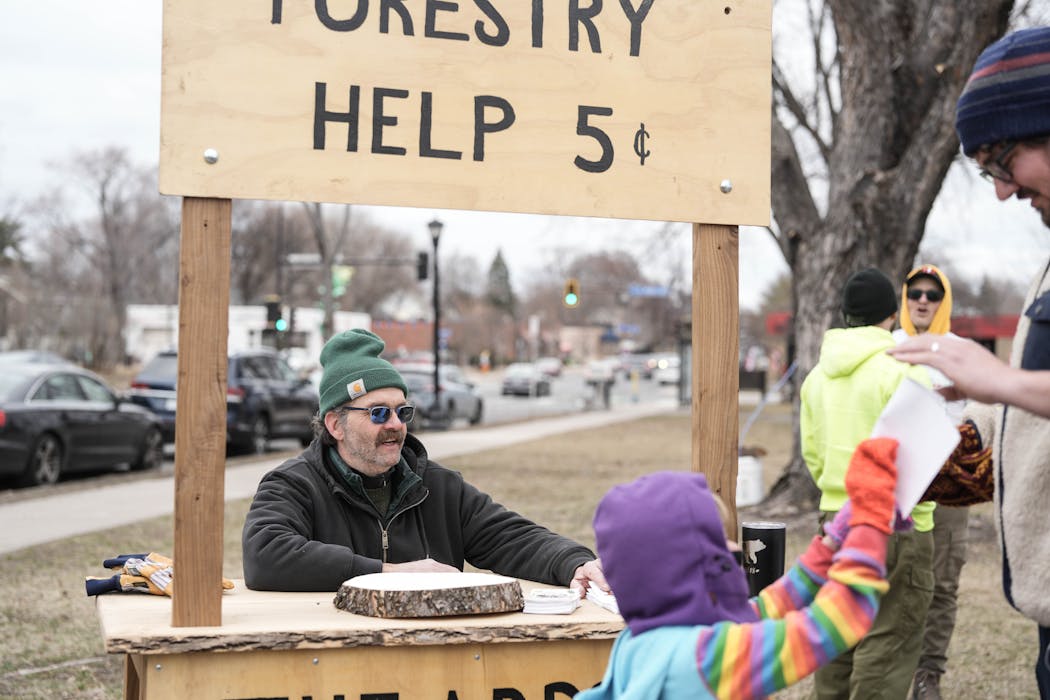Brothers Dana and Jason Hendrickson have spent three decades as arborists taking care of the trees in the award-winning Minneapolis park system. It's a family profession; their father was an arborist starting in the 1970s. Jason's wife worked for the Park Board writing grants for invasive species removals and Dana's daughter has cut grass at Bryn Mawr Park.
The Hendrickson brothers, both in their 50s, say looking after the urban canopy has long been good, honest work. The arborist position was competitive in their father's day, and his pay afforded them a comfortable childhood, with a house in Linden Hills. But in recent years, inflation has consistently outpaced wage growth, leaving the Hendricksons worried for younger colleagues starting families and being unable to afford to live in the city they serve.
"There's not a whole lot of speakers for the trees out there, and I was happy to be one," said Dana Hendrickson, who fondly recalls his father quizzing him on the scientific names for trees and proudly believes being an arborist runs in his blood. "But our buying power is not what it used to be. We want to be moving forward, not backward. I feel like there was more dignity in the position back then."
Many frontline park workers like the Hendricksons say the job has gotten tougher, with challenges ranging from emerald ash borer infestations to homeless encampments developing — and being cleared from — Minneapolis parks. And with tight budgets and higher inflation cutting into pay, tensions have been rising between Park Board management and workers organized with the Laborers' International Union of North America (LIUNA).
Contract negotiations have been ongoing since December without agreement. The union filed for mediation in February, and lately, a small army of LIUNA members have been turning up at Park Board headquarters, holding informational pickets and giving commissioners an earful.
"When I look around at staff, I see people who are really passionate about what they do," horticultural crew leader Matt Gassman said at Wednesday's board meeting. "You'll also hear from those folks that some of us are on food assistance. I've heard people who say they'd like to start a family but that's financially out of reach. ... People are hurting, basically."
In a statement, Park Board spokeswoman Robin Smothers acknowledged it's a tough moment for the agency's budget.
"Unlike the City of Minneapolis, our funding sources are limited. Considering the recent news that property tax collections are down, budget constraints are tighter than ever," she said. "The Park Board is committed to a culture of transparency, communication and listening."
The Park Board's latest wage offer is a 2.75% raise in 2024 without market adjustments, according to LIUNA. Inflation is currently at 3.15% after rising as high as 9% in the summer of 2022, according to the Bureau of Labor Statistics' Consumer Price Index. Wages keep limping behind inflation. Since COVID-19, annual raises for Minneapolis park employees have ranged from 2.25% to 3%.
Workers' purchasing power has diminished, and they say their wages are no longer competitive with those of many other park systems. Under their 2023 contract, top-scale Minneapolis "parkkeepers" earn $30.99 an hour. Data from the League of Minnesota Cities' 2023 local government salary surveyshows 20 suburbs, from Apple Valley to Woodbury, paying "park maintenance workers" $35.55 to $44.98 an hour.
The Park Board is aware of the League's survey results but prefers its own analysis of salary comparisons, which show that Minneapolis park salaries are at or above those of similar organizations, Smothers said. The Park Board's internal wage analysis is not public data because it was created for union negotiations, she said.
Union business manager AJ Lange blames noncompetitive wages for turnover and burnout among the workers who remain. Rules prohibiting workers from criticizing the Park Board and employee discipline perceived as unfair or retaliatory have also sunk morale, he said.
In December, the Park Board required forestry employees to sign new work rules banning certain speech: "Employees should never speak negatively about the MPRB &/or the Forestry Department when communicating with the public. Doing so has the potential of degrading public support which can have budgetary implications."
Some workers thought the new work rule was related to increasing pressure from north Minneapolis environmental activists questioning the Park Board's approach to ash tree condemnations. The union called it illegal and filed an unfair labor charge with the state Bureau of Mediation Services.
The Park Board ultimately rescinded the directive. The work rule was never enforced, and park employees have been notified that is it no longer in effect, Smothers said.
The union says the Park Board is asking for certain contract concessions this year, including: eliminating transfer rights from forestry to park maintenance, a longtime pathway to promotions; limiting subjects permitted in bargaining such as scheduling and staffing levels, and taking away professional development opportunities. The Park Board is also seeking limits on "detail" worker provisions that set pay for people temporarily filling in on high-paid roles.
Park Board leaders declined to discuss concessions, saying they are a part of "confidential" negotiations, but Smothers described the union's characterizations as "misleading."
"Respect in the workplace is key," said Mitch Clendenen, a south Minneapolis crew leader who said he's tired of his workers getting stuck with discarded needles while cleaning parks.
"Treat your workers with respect and stop treating them like they are blue-collar trash," said arborist Scott Jaeger at a Park Board meeting last month. "We are human beings, thank you."
The next mediation session between the Park Board and the union is scheduled for April 16.

Five Minnesota political figures to watch after the 2024 election

This Minnesota county voted blue for nearly 100 years — until Trump

How Minnesota House Republicans ended the DFL's state government trifecta
Project 2025 platform proposal aims to allow mining in Boundary Waters watershed



